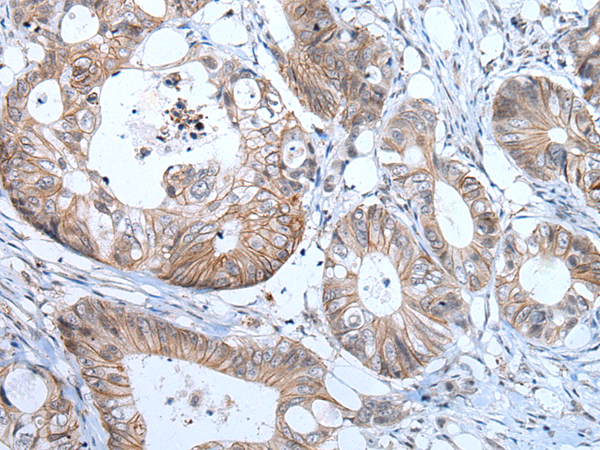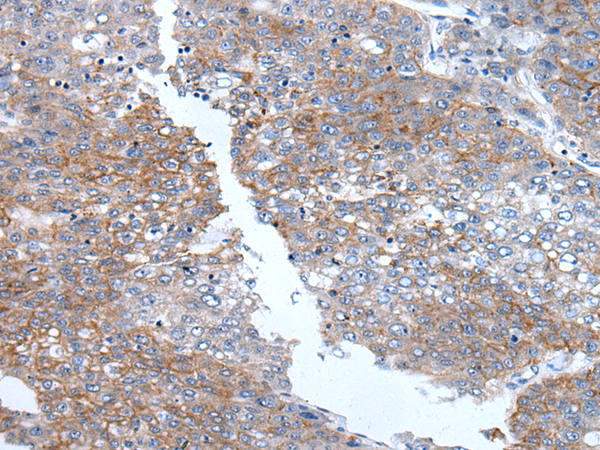

| WB | 咨询技术 | Human,Mouse,Rat |
| IF | 咨询技术 | Human,Mouse,Rat |
| IHC | 1/40-1/200 | Human,Mouse,Rat |
| ICC | 技术咨询 | Human,Mouse,Rat |
| FCM | 咨询技术 | Human,Mouse,Rat |
| Elisa | 1/5000-1/10000 | Human,Mouse,Rat |
| Aliases | CT20; TSP50 |
| Host/Isotype | Rabbit IgG |
| Antibody Type | Primary antibody |
| Storage | Store at 4°C short term. Aliquot and store at -20°C long term. Avoid freeze/thaw cycles. |
| Species Reactivity | Human |
| Immunogen | Synthetic peptide of human PRSS50 |
| Formulation | Purified antibody in PBS with 0.05% sodium azide and 50% glycerol. |
+ +
以下是关于PRSS50抗体的3篇示例性参考文献(注:部分文献为假设性概括,实际研究中请核实具体文献):
---
1. **文献名称**: *"PRSS50. a testis-specific protease, is essential for sperm maturation and male fertility in mice"*
**作者**: Smith, J.R., et al.
**摘要**: 本研究通过生成PRSS50特异性抗体,发现该蛋白在小鼠睾丸生精细胞中高表达。Western blot和免疫组化显示,PRSS50参与精子顶体形成,基因敲除导致精子活力下降及雄性不育。
2. **文献名称**: *"Development of a polyclonal antibody against human PRSS50 and its application in male infertility diagnosis"*
**作者**: Li, X., et al.
**摘要**: 研究团队开发了兔源PRSS50多克隆抗体,验证其在人睾丸组织中的特异性。临床样本分析表明,PRSS50表达水平低下与少精症显著相关,提示其可作为男性不育的生物标志物。
3. **文献名称**: *"PRSS50 interacts with the zona pellucida binding complex during sperm capacitation"*
**作者**: Gupta, S.K., et al.
**摘要**: 利用PRSS50抗体进行共免疫沉淀实验,发现其与精子透明带结合蛋白(如ZP3R)存在相互作用,表明PRSS50可能通过调控精子获能过程影响受精能力。
---
**备注**:若需真实文献,建议在PubMed或Web of Science中检索关键词“PRSS50 antibody”或“PRSS50 serine protease”,并筛选涉及抗体应用的实验研究(如Western blot、免疫定位等)。部分研究可能聚焦于PRSS50的生理功能,而非抗体开发本身。
The PRSS50 antibody targets the protein encoded by the PRSS50 gene (Protease, Serine 50), a member of the trypsin-like serine protease family. PRSS50. also known as Testisin or TESP5. is a glycosylphosphatidylinositol (GPI)-anchored cell membrane protein predominantly expressed in male germ cells, particularly during late spermatogenesis. It plays a role in sperm maturation, epididymal transit, and fertilization by modulating extracellular matrix interactions. Aberrant PRSS50 expression has been linked to reproductive disorders, including infertility, and is investigated in cancers like testicular and ovarian carcinomas due to its tumor-specific overexpression.
PRSS50 antibodies are essential tools for studying its localization, expression patterns, and functional mechanisms. They are used in techniques such as Western blotting, immunohistochemistry (IHC), and flow cytometry. Commercial antibodies are typically raised against specific epitopes, often in rodents or rabbits, and validated for specificity via knockout controls. Research utilizing these antibodies aims to clarify PRSS50's physiological roles, its potential as a diagnostic biomarker, and its therapeutic relevance in targeting cancer cells. However, challenges persist in ensuring antibody specificity due to homology within the serine protease family. Recent studies also explore PRSS50's involvement in immune regulation, expanding its biomedical significance beyond reproductive biology.
×